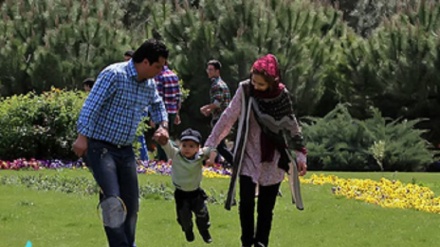Iranian Family (34)
Welcome to this week's episode of the series "Iranian Family". Divorce is a process which occurs over the years among spouses, surfacing upon reaching its acute phase. Today, we discuss this issue of concern.
Today, divorce is defined in two forms: One is the official divorce; within which the married couple, upon reference to court, legally separate from each other, and no longer maintain any mutual commitment.
The other type is the emotional divorce, within which the married couple live under the same roof but do not maintain any emotional bonds toward each other. Emotional divorce is evident among married couples whose marriage is on a downward spiral. Meanwhile, several intricate psychological and social factors lead to emergence of this unwanted phenomenon. Couples' distrust, unfamiliarity, and financial concerns can cause this unwanted phenomenon. Today, we elaborate upon this type of separation and its related consequences.
Under the circumstances in which the married spouses are not psychologically interested in continuation of their married life, and in the aftermath of a long period of heated arguments, they go beyond the state of animosity and resentment, and enter the phase of indifference. Indifference is the last phase of the married couple's emotional bond. Such married couples live together. However, they do not sense any emotional bond toward each other. They have only got used to living with each other. The everyday dialog among such married couples decline, while their fervor and enthusiasm is replaced by a mutual sense of despair.
Married couples who no longer feel an emotional bond toward each other, only live under the same roof so that their children would have a family and parents. However, their children realize the painful life of their parents, and know that there is no trace of love and emotion in their home.
The well-known psychologist, Dr. Mousavi, points out that if married couples talk to each other, they would not face emotional divorce. When emotional wounds are healed, amity and kindness runs through the family. However, if emotional wounds are not healed, resentment and hatred surfaces. Under such circumstances, life turns into a battlefield, and after a while, spouses' energy is drained, pushing them towards mutual indifference.
Humans are extraordinary creatures due to a number of reasons, such as their sense of discretion and determination. The conflict of wills is one of the most important issues in the social relationships among individuals. Thus, one cannot expect any communication in the absence of the contrast of wills, given that changes in the behavior, demands, and aspirations of individuals is a natural phenomenon.
In other words, all individuals have differences of opinion, which can be easily solved via dialog. Married couples should get to fully know each other in the early stages of their married life, and upon gaining this mutual understanding, establish a mutual dialog. Unfortunately, some married men and women do not get on with each other, and because of having differences of opinion, try to impose their views on one another.
Experts believe that emotional divorce is the consequences of negative criticism. Sometimes, individuals blame their spouse for issues that have nothing to do with the latter, thereby souring their relationship. Unjustified criticism causes pessimism in the family.
Although Islamic texts have presented numerous important advices about family, unfortunately infidelity is one of the causes of emotional divorce among couples.
Lack of religious beliefs and absence of commitment is also one of the causes of a surge in extra-marital affairs, which sours ties among married couples, and leads to emotional divorce.
Continued expression of kindness is one of the necessities, which should be fulfilled in married life.
One of the advantages of sacred religion of Islam is that it leaves the possibility of remarriage of divorced woman with her ex-husband. The Islamic rulings on divorce point out that the divorced woman should observe a waiting period, known as "Eddeh", lasting for three months, prior to marrying someone else.
MR/ME


